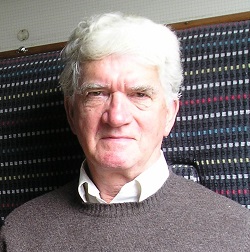William Sowerbutts 1942-2020

Innovative geophysicist who pioneered the use of computer-aided learning
Dr WTC Sowerbutts, known to all as Bill, grew up on a small farm at Flamstead in Hertfordshire where he spent much of his childhood tending chickens, pigs and vegetables. He had an interest in geology from picking stones off the lane and fields and went on to graduate with a geology degree from Leicester University. He took part in the Geological Society Students’ Instructional Tour to the Alps in 1965. Bill’s PhD in geophysics from Newcastle University examined gravity and magnetic anomalies over the East African Rift.
Glasgow and Manchester
Bill’s first job was as a research assistant at Glasgow University undertaking geophysical surveys around Mull and Skye. In 1972 he secured a permanent job as a lecturer in geophysics at the University of Manchester, where he spent the rest of his career until retirement in 2000.
His early research focused on East Africa, making measurements by cycling round with a gravimeter on the back of a bike, resulting in two Nature papers. Bill was a pioneer in using shallow geophysics for site investigations, including to locate mineshafts and archeological structures, and he published on topics as diverse as locating pipeline joints and volcanic dykes. He also undertook geophysical surveys for energy companies across north-west England.
Innovation
Today Bill would be called an innovator – he designed some of the first mobile digital gravimeters and magnetometers connected to an Apple computer on a modified wheelbarrow, and starred on the front cover of ‘Windfall’ magazine. He established a great practical teaching course where students had hands-on experience of using geophysical equipment. Bill was a quiet man who never sought the limelight but was always ready to help.
Bill was well ahead of his time in computer-aided learning, setting up a very early teaching computer cluster of Apple Macs at Manchester and developing 3D visualisation software. In 1992 he established the UK Earth Science Courseware Consortium (UKESCC) as a non-profit making organisation to develop, produce and distribute interactive courseware for use in Earth sciences teaching and learning. As chair of the Geological Society of London computing committee in the 1990s, Bill was a regular visitor to Burlington House.
Retirement
Bill continued to develop his interests in retirement, from making stone sculptures to woodturning. He was a lifelong vegetable gardener and organised lectures and excursions for the Cottage Garden Society. Bill was active in the garden until suffering a short period of ill health. He is survived by his wife Morven, daughter Alison, also a geologist, and two grandchildren.
By Alison Monaghan (nee Sowerbutts) with contributions by Kate Brodie